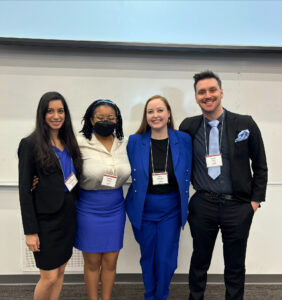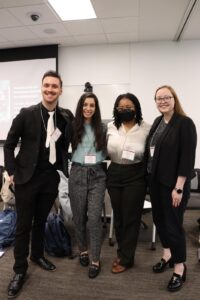Four students represent HSC at national IPE competition
- May 14, 2024
- By: Libby Maness
- Education
Related Links
 Last month, four students from The University of North Texas Health Science Center at Fort Worth headed to Minnesota to represent HSC at the CLARION National Interprofessional Case Competition. CLARION is a student-driven, staff/faculty-advised committee that focuses on the professional development of health professional students and includes lessons on leadership, teamwork and communication. Participating teams gain preparation in interprofessional practice.
Last month, four students from The University of North Texas Health Science Center at Fort Worth headed to Minnesota to represent HSC at the CLARION National Interprofessional Case Competition. CLARION is a student-driven, staff/faculty-advised committee that focuses on the professional development of health professional students and includes lessons on leadership, teamwork and communication. Participating teams gain preparation in interprofessional practice.
Zachary Olson, Folasade Fashina, Haley McKeefer and Mira Sankhavaram were chosen to represent HSC based on IPE involvement and faculty recommendation, Cynthia Carroll, interprofessional education director in the Department of Interprofessional Education explained.
“HSC is invited to this national competition every year, but this is the first year we actually sent students,” Carroll said. “I really wanted to send students who had an interest in IPE, and our faculty members were so excited to sponsor them.
“They’ve all worked very hard in their respective programs, and this was a great way for us to honor them and their hard work.”
Olson and McKeefer both represented the College of Pharmacy, Folasade Fashina represented the School of Public Health and Mira Sankhavaram represented the Texas College of Osteopathic Medicine.
Preparing for a pandemic
Teams competing at CLARION were given two months to review a prompt and prepare their presentation materials. The prompt focused on an Influenza A pandemic projected by the World Health Organization to start April 2025. The team was asked to choose a focus area to inform about the looming pandemic – they chose school districts. Based on the focus area, the students had to formulate a mitigation strategy to effectively share information about the pandemic.
The students met several times to discuss the prompt, their plan and any research that would help them best prepare for their presentation in Minnesota.
“There were so many different parts to this case, encompassing a variety of core issues that we would need to find solutions for,” Sankhavaram said. “We created a list of primary objectives we would like to accomplish for this school district, while each of us focused on tackling a specific priority – whether vaccine hesitancy, or medical misinformation – that needed to be addressed for our target population.”
Once they felt ready, the students met with Carroll and Emily Dos Santos, assistant director for the Department of Interprofessional Education and Practice, to run through their presentation.
The competition
 The first day of the competition offered virtual reality and makerspace experiences, followed by a vaccine hesitancy simulation and a communication workshop.
The first day of the competition offered virtual reality and makerspace experiences, followed by a vaccine hesitancy simulation and a communication workshop.
The student team presented to a panel of judges on day two. Each team was given 15 minutes to present, 10 minutes for Q&A and 5 minutes for feedback. Though HSC’s team did not place in the top three, the students learned through the experience and are proud to have represented the institution, Dos Santos explained.
Interprofessional approach to education
All four students were quick to credit their professors and coursework at HSC for preparing them for this competition.
“Considering the topic of the case, much of my public health course work prepared me for a scenario like this,” Fashina said. “I was able to utilize what I learned in my Theoretical Foundations for Individual and Community Health and Community Assessment and Program Planning to name a few.”
TCOM’s emphasis on viewing patients as more than symptoms helped Sankhavaram as she helped her team with the presentation.
“My training at TCOM so far really helped me with this scenario,” Sankhavaram said. “Understanding the social determinants of health helped us formulate a strategy that reached all communities involved, especially those lacking the appropriate resources for access to healthcare and online education..”
For McKeefer and Olson, the pharmacy industry itself thrives through the work of interprofessional teams. Having the ability to practice working with a future physician and future public health professional not only helped them represent HSC well, but also helped prepare them for a career beyond the classroom.






Social media